- Home
- Cheryl Bolen
The Bride's Secret Page 2
The Bride's Secret Read online
Page 2
After shoving her sewing in the drawer of her work table, Carlotta rose, crossed the faded carpet and opened the door to her landlady.
Without being asked, Mrs. McKay strolled into the room, sighing deeply.
“Won't you sit down?” Carlotta asked.
The plump, red-headed matron sat on the settee Carlotta had just vacated, a frown on her well painted face. Carlotta seated herself on the edge of a nearby armchair, her stomach tumbling over the dreaded confrontation.
The landlady mopped her aging brow with a hanky. “I don't get up those stairs as well as I once did.”
Carlotta nodded sympathetically.
Mrs. McKay's ample bosom lifted in an exaggerated sigh, and her face folded into a pained expression. “I had hoped it would not come to this, Mrs. Ennis, but if I cannot soon obtain the last quarter's rent you owe, I am going to be forced to evict you.”
Now it was Carlotta who sighed. Where did the money go? She had never had much of a head for numbers and was hopeless with managing money. If she had it, she spent it. Every last farthing.
As of late, she had tried her best to economize—really, she had. She'd not gone to the milliner's in a year. Of course, she had not needed to. She still possessed an extraordinary wardrobe. White champagne gave way to cheaper wine, then to tea, and now she drank only one cup a day. She had switched from candles to the cheaper tallows and could barely afford any coal. Green peas were so dear they were only a memory, as was the generous settlement from Gregory.
Her fine carriage had been sold—at a huge loss. And what good was her elaborate wardrobe when she had no where to wear the ball gowns with trains, the morning dresses and promenade wear in every color of the rainbow—with hats and shoes to match each. She had sold off all the jewels Gregory had given her, except for the diamonds. Within the next fortnight, they, too, would be gone. Then she would have nothing left of Gregory, save the emptiness in her heart.
“If you could but wait until the first of next month,” Carlotta said, “you'll receive what is due as well as an advance on the next quarter.”
The worry lifted from the elder woman's face. “If you can assure me, then that would be fine and good. A lady of quality such as yourself is precisely the type of tenant I wish to have, but I do have my own bills to see to.”
“I understand perfectly, Mrs. McKay,” Carlotta said. “Since...since I've been ill, I've acquired a great many debts myself, but I assure you that you're at the top of my list, come the first of the month.” Unlike the promises she made to the other tradesmen, this one she meant to honor. She simply had to keep a roof over head. Nothing could be worse than returning, as an unmarried woman, to Gran's house and burying herself in dreary Yorkshire.
Mrs. McKay stood up, crossed the carpet and patted Carlotta's shoulder. “There, there, Mrs. Ennis, all will come about—once you get your health back.” Her eyes traveled the length of Carlotta. “You look poorly. You've grown ever so thin.”
Carlotta nodded. She couldn't deny the woman's words. Indeed, she had lost her appetite—and so much more.
“If I might be so bold as to make a suggestion,” Mrs. McKay began, “if you'd sack your young woman, you'd have ever so much more money.”
Sack Peggy! Carlotta would beggar first. Since she'd rescued the starving thirteen-year-old Peggy from the London wharves upon returning from Portugal, Carlotta had formed a bond with the frail young woman that was as irrevocable as the tides. Peggy had served Carlotta alternately as abigail, cook and housekeeper during feast and during famine.
A huge lump formed in Carlotta's throat as she remembered Peggy vowing undying loyalty while inarticulately telling her that their relationship had been the only constant in the maid's dreary life.
“That is completely out of the question,” Carlotta said to Mrs. McKay. “I am all that Peggy has in the world. I could never sack her.”
The old woman shrugged. “I'll just let myself out,” she said meekly.
After her landlady left, Carlotta went directly to her bed chamber, donned her pelisse and decided to take a walk. A walk along the Royal Crescent would do her good. She had spent far too many days prostrate on her bed, crying over a love long lost and never to be resurrected. Buttoning her pelisse, closing the door behind her and descending the stairs, she left the precarious security of Mrs. McKay's chambers to ponder her hopelessly befuddled circumstances.
The few pounds she received each quarter from her late husband's estate did not go very far. First, she had to send half of it to Gran. The other half would not even cover half her bills. And never was there a penny left. What was she to do? Carlotta had always thought she would marry again. Indeed, she had never believed Gregory when he insisted he would never wed her. I'll bring him around, she had thought with as much confidence as foolishness.
Now she knew her beauty was no longer enough to secure a husband. Now that she had tarnished herself. The best she could hope for was to be set up as some peer's ladybird. No, she could never allow herself to sink that low. She had loved Gregory fiercely enough to ruin herself—but to cold-heartedly make an arrangement? She shuddered.
She took a deep whiff of the fresh air. She had kept herself cooped up long enough. Despite her recent misery, Carlotta would rather live in Bath than anywhere else. Yorkshire farm life had been fine for a youngster—including her own son who was being raised there—but for a woman who had seen the world and relished living in the bustling city of Bath, Yorkshire countryside seemed as lifeless as a tomb.
With the verdant hills as a backdrop, Carlotta headed down Royal Avenue toward the Royal Crescent, but could not help but sink deeper into hopelessness, for there were no solutions for any of her problems. It would be easy for her to wallow in self-pity. After all, she had become a widow at nineteen when her husband—the third son of an earl—was killed in the Peninsula. Then four years later she had recklessly fallen completely in love with Gregory Blankenship, who would not offer marriage. Not to her, anyway. Tears pricked her lids as she thought of how he'd turned to his best friend's young sister for a bride. It wasn't fair.
But Carlotta had seen enough of life to know unhappiness did not last forever. At the end of every storm, a rainbow bridged the way to a new and better day. Surely her rainbow was due. Throughout the valleys and peaks of her life, poetry had always sustained her. Now these words brought solace. Come grow old with me. The best is yet to be. She refused to give in to gloom. Somewhere on this earth there was a man with whom she would grow old—and reap her elusive happiness.
When she returned to her lodgings, Mrs. McKay met her at the Queensbury Street door, her eyes glowing triumphantly. “You've had a caller while you were out, Mrs. Ennis. I've asked Lord Rutledge to await your return in my parlor.”
Lord Rutledge? Carlotta did not know anyone by that name. A puzzled look on her face, Carlotta followed her landlady into the parlor.
He stood when she entered. He was quite young—about her age, she guessed. From the top of his sandy head to the tips of his well polished Hessians, Lord Rutledge personified sturdy good looks. He wasn't as handsome as Gregory—but, then, no one was. Lord Rutledge did possess a tall, athletic body, wore well tailored clothing and shot her a grin that was as familiar as it was friendly. Where had she seen this man before?
“Lord Rutledge?” she said tentatively.
He stepped closer to her and swept into a bow. “Perhaps you would know me better were I in red regimentals. I am James Moore.”
How could she not have recognized the man whose disobedience had cost Stephen's life? He obviously enjoyed prime good health and discreetly displayed wealth, while poor, dear Stephen lay buried in foreign soil these six years past. Surely the man did not expect her to bear his company. What could she possibly have to say to him? Life appears to have treated you well, my lord? Please leave my house because you are not welcome here? She glanced from him to an obviously besotted Mrs. McKay and decided to tolerate him for a short period. She could not cau
se a scene in front of Mrs. McKay. It wouldn't do to get thrown out of her lodgings.
* * *
As soon as she had realized who he was, her entire demeanor had stiffened unnaturally. When she finally spoke, she could barely conceal the iciness in her voice. “Won't you come upstairs and have tea, my lord?”
James had expected a cool reception. He had deserved it. Actually, he had expected far worse. At least Mrs. Ennis had not bounced him from her residence. “I should be delighted,” he said.
Facing the lovely Carlotta Ennis for the first time in six years left James feeling like an awkward schoolboy at his first dance. She was as beautiful as he remembered. Still smelling of lavender and filling out the bodice of her lavender silk better than any woman he'd ever known, she had become slimmer, and something about the hollowness in her delicate face testified to a sorrow he felt responsible for.
Not without pleasure, he left behind the talkative Mrs. McKay, who now probably knew far more about him than Stephen Ennis's widow did, and he followed Carlotta up a dark wooden staircase to the second floor.
In her lodgings there, Carlotta addressed a youthful maid. “Please prepare a pot of tea, Peggy.”
It seemed to James the maid directed a scolding glance at her mistress. Was tea such an extravagance? James wondered.
He surveyed Mrs. Ennis's parlor. Furnished in the fashion popular a generation earlier, the room definitely did not measure up to what Carlotta must have expected when she had married the son of an earl. It pained James to see her living here in a house she did not even own.
She came back and sat on the faded brocade sopha across from him, then addressed him in a voice devoid of emotion. “Has an infirmity brought you to Bath, my lord?”
“No, Mrs. Ennis, I enjoy excellent health and was fortunate to escape unscathed from Waterloo.”
Since she made no response, he continued. “Actually, you are the reason I am here.”
She raised her brows. “Me?”
“You and your son. I am responsible for the two of you. Now that I've inherited, my fondest desire is to be of service to you.”
Her hands fisted in her lap. “I want nothing from you, and my son wants nothing from you.”
He had known this would be difficult, but he hadn't expected her harshness could wound so deeply.
Her maid entered the room and set a tray of tea cakes with a pot of freshly brewed tea on the table in front of them. Carlotta busied herself dispensing the sugar and pouring his tea. Even in her somewhat shabby surroundings, Carlotta Ennis was the most elegant creature he'd ever known. Her gilded porcelain teapot and floral cups were opulent yet dainty, like the woman who possessed them. The roses in her carpet bespoke her femininity though not nearly as thoroughly as her graceful person.
He tried not to stare at her lovely breasts—though it was not without difficulty. He, therefore, fixed his vision on her delicate hands as she prepared the tea. His gaze moved to her aquiline profile. Only stray fly-away tendrils of silken hair humanized an otherwise marble-like statue of perfection.
His mouth went dry, his voice hoarse. “Whether you want my assistance or not, Mrs. Ennis, I shall remain in Bath until such time as I determine I am not needed.”
The teacup clattered to the saucer as Carlotta directed an irate glance at James. “Stay in Bath if you like. It's nothing to me.”
He spoke almost to himself. “I've asked myself a thousand times why Captain Ennis—a husband and father—and not me.”
The anger seemed almost to drain from her graceful body as she shot him an arrogant look. “It must be as Lord Byron says. Heaven gives its favorites early death.”
James lowered his head. “Indeed. There was never a finer man than Captain Ennis.”
She handed James his tea. “And nothing you ever do will bring him back.”
“I'm neither fool enough to believe I could replace a husband and father, nor unconscionable enough not to try to help. May I see your little boy?”
She stiffened. “He doesn't live with me.”
Her words were like a blow to him. “Then . . .where is he?”
“In Yorkshire with my grandmother. Since she had four sons and also raised my brothers, and since she lives in the country, I believe Stevie is better off there with her than he would be with me.”
“I had hoped to. . .” he trailed off. How could he tell the boy's mother he had hoped to help raise the lad? “I suppose your grandfather is most happy to have a lad about.”
She coughed. “Unfortunately, my grandfather died before Stevie was born.”
“Then Stevie has no men to influence him?” James's agitated voice did not conceal his disappointment. By Jove, the boy needed a man, he thought angrily.
Her eyes lowered as she shook her head, and for the first time he detected emotion in her demeanor. Was it guilt?
“I've brought the lad a gift,” he said, reaching for a package he'd placed at his feet. “It's a toy sword, an exact replica of the one his father used in the Light.”
She made no move to accept it. “And will you tell my son that because of your negligence, his father is dead?”
He swallowed hard, letting the package drop. “I had hoped not to dredge up the past but to ensure hope for the future.”
Anger flashed in her eyes. “Stevie and I want nothing from you, my lord.”
He got to his feet. “Nevertheless, I will make myself available to you. I mean to be of assistance to you and the child, and I shall wait until the day I can. Every day I will sit within my carriage in front of your residence. You will learn to depend upon my reliability.” He spun away and headed for the door.
“I think not.” Carlotta spat the words at him.
* * *
He had not been gone five minutes when Mrs. McKay trudged up the stairs to Carlotta's chambers and pounded on the door.
“Yes?” Carlotta said, opening the door and gazing into her landlady's excited face.
This time Mrs. McKay made no move to cross the threshold. “I want to thank you for coming up with the money earlier than promised,” she said in wheezed gasps. “No one's ever paid me a year in advance before.”
Carlotta had no idea what the woman was talking about. Had she gone delusional? Then, in a burst of sudden revelation, Carlotta knew. “Lord Rutledge?”
The cagey woman nodded. “Such a fine gentleman to come all the way to Bath to repay the debt he owed your husband.”
Mrs. McKay had obviously been waiting, ear to her door, for James's departure so she could gloat about his generosity. Glancing over Mrs. McKay's shoulder, Carlotta impatiently asked, “Was there anything else, Mrs. McKay?”
“Mercy me, no. I've got to go take the waters.”
Carlotta watched her landlady hold tightly to the rail as she ambled down the poorly lit stairway, the slender Peggy pausing at the landing for the heavier woman to pass. Peggy flattened herself and smiled and seemed about to burst with excitement. Once she was face to face with her employer, she began to squeal. “Oh, madam, you won't believe our good fortune!”
Oh, but Carlotta could. “You've been to the greengrocer's?”
Peggy nodded, her broad smile revealing an airy gap between her front teeth.
“And our bill has been settled there.”
The girl's green eyes widened. “However did you know?”
“I expect you'll find all our bills have been paid. It seems Lord Rutledge is settling a large debt he owed my late husband.”
“The gent who had tea with you?”
Carlotta nodded as they entered the parlor, shutting the door behind them.
“You should see his fine carriage, ma'am. It's even nicer than Mr. Bl---”
“Peggy,” Carlotta snapped, “I should like for you to learn if my suspicions are correct. Go to all the tradesmen we owe money and find out the extent of our debt. I believe Lord Rutledge will have preceded you.”
“What a fine lord he must be!” Peggy said, turning on her soft kid
slippers—a hand-me-down from Carlotta—and leaving the rooms let by her mistress.
Carlotta needed to be alone to ponder the afternoon's events. Seeing Mr. Moore—who was now Lord Rutledge—steeped her once again in the agony of grief, coldly reminding her of the words she would never be able to utter to the noble Stephen Ennis.
She pictured the nervous Lord Rutledge, and now that he was gone, she could admit a peculiar admiration for him. Not many men would have the courage to try to make amends. She'd been quite brutal to him.
If only she'd had more time to prepare for their meeting. As it was, his sudden appearance plunged her anew into the despair she'd experienced six years ago. The day she'd lost Stephen.
Without being aware of her actions, Carlotta moved to her bedchamber, removed the pelisse she was still wearing—then collapsed on her bed as tears cascaded down her cheeks. She felt as alone as she had that fateful day in Portugal. Perhaps she wouldn't be so lonely if the boy were with her. And if the boy were with her. . .mayhap through him she could gain absolution from his father. No doubt from the heavens that so favored him, Stephen looked down on the son who bore so strong a resemblance to him.
Chapter 3
The following morning Peggy answered a knock and faced a manservant presenting a lace-wrapped nosegay of colorful blooms. “From my master to your mistress,” he said. “And please tell Mrs. Ennis my master awaits her command from his carriage below.”
Peggy all but flew to the little round table where Carlotta was taking her breakfast beside the window. “It's just as I told you, ma'am. He's such a fine lord.” She handed her mistress the flowers, but Carlotta took no interest in them.

 With His Lady's Assistance (The Regent Mysteries Book 1)
With His Lady's Assistance (The Regent Mysteries Book 1) Once Upon a Time in Bath
Once Upon a Time in Bath One Room at the Inn (The Lords of Eton Book 4)
One Room at the Inn (The Lords of Eton Book 4) His Lady Deceived
His Lady Deceived Last Duke Standing
Last Duke Standing Counterfeit Countess: Brazen Brides, Book 1
Counterfeit Countess: Brazen Brides, Book 1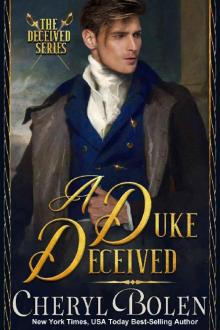 A Duke Deceived (The Deceived Series Book 1)
A Duke Deceived (The Deceived Series Book 1) An Egyptian Affair (The Regent Mysteries Book 4)
An Egyptian Affair (The Regent Mysteries Book 4) Winter Wishes: A Regency Christmas Anthology
Winter Wishes: A Regency Christmas Anthology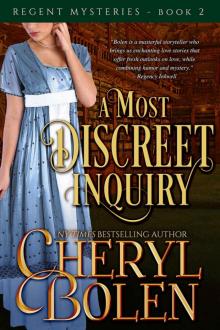 A Most Discreet Inquiry (The Regent Mysteries Book 2)
A Most Discreet Inquiry (The Regent Mysteries Book 2) The Portrait of Lady Wycliff
The Portrait of Lady Wycliff A Lady by Chance (Historical Regency Romance)
A Lady by Chance (Historical Regency Romance) His Lordship's Vow (Regency Romance Short Novel)
His Lordship's Vow (Regency Romance Short Novel) Lady Sophia's Rescue (Traditional Regency Romance)
Lady Sophia's Rescue (Traditional Regency Romance) A Birmingham Family Christmas
A Birmingham Family Christmas Oh What A (Wedding) Night (Brazen Brides #3)
Oh What A (Wedding) Night (Brazen Brides #3) A Christmas In Bath
A Christmas In Bath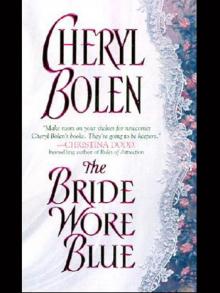 THE BRIDE WORE BLUE
THE BRIDE WORE BLUE Miss Hastings' Excellent London Adventure (Brazen Brides Book 4)
Miss Hastings' Excellent London Adventure (Brazen Brides Book 4)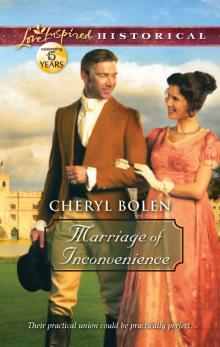 Marriage of Inconvenience
Marriage of Inconvenience Ex-Spinster by Christmas: House of Haverstock, Book 4
Ex-Spinster by Christmas: House of Haverstock, Book 4 With His Ring (Brides of Bath Book 2)
With His Ring (Brides of Bath Book 2) The Theft Before Christmas (The Regent Mysteries)
The Theft Before Christmas (The Regent Mysteries) The Theft Before Christmas
The Theft Before Christmas To Take This Lord (The Brides of Bath Book 4)
To Take This Lord (The Brides of Bath Book 4)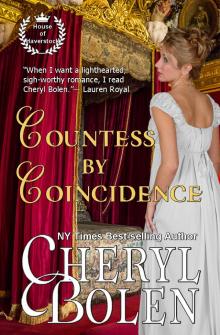 Countess by Coincidence
Countess by Coincidence Captivated by His Kiss: A Limited Edition Boxed Set of Seven Regency Romances
Captivated by His Kiss: A Limited Edition Boxed Set of Seven Regency Romances A Birmingham Family Christmas (Brazen Brides Book 5)
A Birmingham Family Christmas (Brazen Brides Book 5)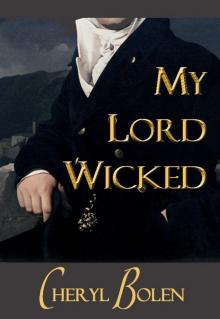 My Lord Wicked (Historical Regency Romance)
My Lord Wicked (Historical Regency Romance) A Duke Deceived
A Duke Deceived The Earl, the Vow, and the Plain Jane
The Earl, the Vow, and the Plain Jane The Bride's Secret
The Bride's Secret The Earl's Bargain (Historical Regency Romance)
The Earl's Bargain (Historical Regency Romance) Rebels, Rakes & Rogues
Rebels, Rakes & Rogues One Golden Ring
One Golden Ring